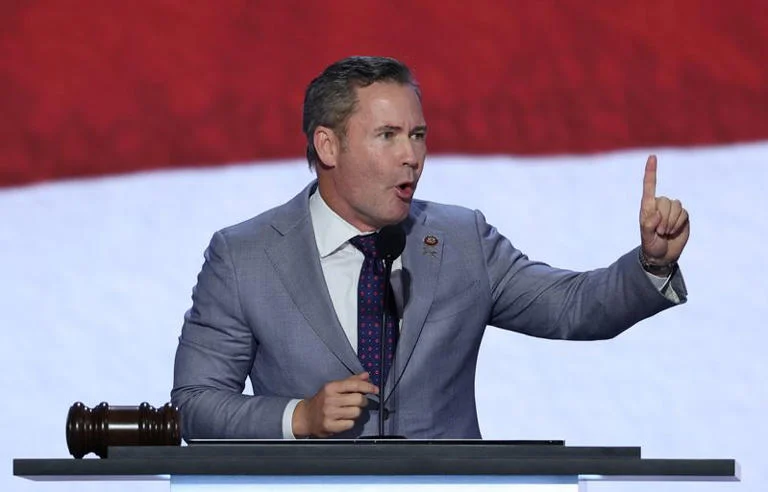The selection of a National Security Adviser (NSA) is one of the most significant decisions a U.S. president makes during their term. This key position is responsible for advising the president on matters of national security, foreign policy, and military affairs. Recently, sources confirmed that former President Donald Trump has selected Mike Waltz as his new National Security Adviser. Waltz, a Republican representative from Florida and a former Green Beret, has garnered attention due to his unique combination of military expertise and political acumen.
This article delves into the background of Mike Waltz, explores why he was chosen for this crucial role, and analyzes what his selection might mean for U.S. foreign policy and national security. Additionally, we will provide insights into the challenges and opportunities that Waltz’s appointment could present.
The Importance of the National Security Adviser Role
The National Security Adviser (NSA) plays an essential role in shaping the nation’s foreign policy and national security strategy. The NSA is tasked with advising the president on critical security matters, including military readiness, intelligence gathering, counterterrorism, and international relations. The individual in this position must work closely with other government agencies such as the Department of Defense, CIA, FBI, and Homeland Security to ensure a coordinated response to threats both domestically and abroad.
Given the growing complexity of international relations and security challenges, the role requires not just expertise but also the ability to navigate political waters effectively. Trump’s selection of Mike Waltz comes at a time when national security is more important than ever, especially amid increasing global tensions.
Who is Mike Waltz? A Background Overview
Early Life and Education
Mike Waltz was born on January 31, 1974, in Florida. He earned his bachelor’s degree from the University of North Carolina at Chapel Hill, where he studied political science. Waltz later went on to receive a master’s degree in international relations from the prestigious Johns Hopkins University School of Advanced International Studies (SAIS).
His academic background laid the foundation for his understanding of global affairs, and his commitment to public service would soon be realized through his military career.
Military Service and Leadership
Waltz’s military career began when he joined the U.S. Army and became a Green Beret. His service in the Special Forces demonstrated his leadership capabilities and his ability to operate in high-stakes environments. Waltz participated in numerous missions around the world, including counterterrorism operations in the Middle East, which shaped his deep understanding of the challenges facing U.S. national security.
Throughout his military service, Waltz earned several commendations and awards for his leadership and bravery, including the Bronze Star. His experience in leading teams on the front lines of global conflicts would be invaluable in his new role as National Security Adviser.
Political Career and Achievements
After retiring from the military, Waltz transitioned into politics. He served as a national security and defense policy adviser to former Vice President Dick Cheney and worked as a policy expert for various think tanks. His political career culminated in his election to the U.S. House of Representatives in 2018, representing Florida’s 6th Congressional District.
During his time in Congress, Waltz gained a reputation as a strong advocate for national defense and military readiness. He was particularly vocal about the growing threats posed by China, Russia, and Iran. His legislative work focused on strengthening the military and supporting veterans, as well as advocating for a tough stance against global terrorism.
Trump’s Selection Process: Why Mike Waltz?
Alignment with Trump’s Foreign Policy Goals
One of the key reasons Trump selected Mike Waltz as National Security Adviser is the alignment between Waltz’s foreign policy views and Trump’s priorities. Throughout his presidency, Trump emphasized the importance of military strength, America First foreign policies, and a more cautious approach to international entanglements. Waltz shares many of these views, particularly when it comes to confronting global adversaries like China and Russia.
Additionally, Waltz has been a vocal proponent of strengthening the U.S. military and focusing on cutting-edge technologies such as cybersecurity and artificial intelligence—areas of growing importance in global security.
Waltz’s Political and Military Experience
Waltz’s extensive military experience combined with his time in Congress positions him as a highly qualified candidate for the NSA role. His ability to understand military operations while navigating the complexities of U.S. foreign policy makes him an ideal choice for a job that requires both strategic vision and operational expertise.
Moreover, Waltz’s strong relationships with military leaders and lawmakers could help him bridge the gap between the executive branch, Congress, and the Department of Defense.
Mike Waltz’s Vision for National Security
Focus on Strengthening National Defense
As National Security Adviser, Waltz is expected to advocate for a robust and modernized military that is ready to face emerging threats. His vision involves maintaining technological superiority in areas like cyber warfare and space defense. Waltz has also been an outspoken supporter of increasing defense budgets to ensure that the U.S. military remains the most powerful in the world.
Addressing Global Threats
Waltz has consistently warned of the growing challenges posed by global threats such as terrorism, nuclear proliferation, and the rise of authoritarian regimes. As National Security Adviser, he is likely to focus on counterterrorism operations and military readiness to address these issues. His leadership in addressing the threat from ISIS and his work on countering Russian and Chinese influence are expected to be key priorities.
Potential Impact on US Foreign Relations
Relations with Russia, China, and North Korea
Waltz’s tenure could bring significant changes to U.S. relations with global powers. Waltz has been critical of both Russia’s actions in Eastern Europe and China’s growing military assertiveness in the South China Sea. His appointment suggests that Trump may take an even tougher stance on these nations, using economic sanctions, military deterrence, and diplomatic pressure as tools to safeguard U.S. interests.
Regarding North Korea, Waltz’s expertise in military affairs will likely influence the administration’s approach to denuclearization and peace negotiations.
Strengthening Alliances with NATO and Global Partners
Waltz has shown a commitment to strengthening alliances with NATO and other global partners. Under his leadership, the U.S. may deepen cooperation with European and Asian allies to counter shared threats, particularly from Russia and China. Waltz’s approach could involve a mix of military collaboration and diplomatic engagement.
Analysis of Waltz’s Approach to Cybersecurity and Technology
In today’s digital age, cybersecurity is a critical component of national security. Waltz has emphasized the need for robust defense against cyberattacks, especially those originating from adversarial nations like Russia and China. As National Security Adviser, he is expected to push for advanced technologies to protect the nation’s digital infrastructure, including enhancing the capabilities of the Cyber Command and supporting private sector efforts to bolster cybersecurity.
Challenges Ahead for Mike Waltz
Balancing Domestic and International Priorities
One of the primary challenges Waltz will face is balancing domestic security concerns with international affairs. The U.S. faces significant internal issues, such as political polarization and domestic terrorism, which could require attention alongside global threats.
Handling Criticism and Controversies
Like any National Security Adviser, Waltz will face scrutiny and criticism, particularly regarding his stance on military interventions and foreign policy. He must navigate the pressures of managing public opinion while executing policies that ensure U.S. safety.
Frequently Asked Questions (FAQs)
- What is the role of the National Security Adviser?
- The National Security Adviser is responsible for advising the president on matters of national security and foreign policy. They coordinate efforts across agencies like the CIA, FBI, and Department of Defense.
- What makes Mike Waltz a strong candidate for National Security Adviser?
- Waltz’s extensive military background as a Green Beret and his experience as a political leader in Congress provide him with the skills needed to handle the complexities of national security.
- How might Waltz impact U.S. relations with Russia?
- Waltz has been a vocal critic of Russian aggression and is likely to push for tougher sanctions and military responses to Russia’s actions in Europe.
- What challenges will Mike Waltz face as National Security Adviser?
- Waltz will need to balance domestic concerns with international threats, all while managing political pressures and criticism from various sectors.
Conclusion
Trump’s selection of Mike Waltz as National Security Adviser is a strategic move that aligns with the former president’s foreign policy goals of strengthening U.S. military power and confronting global threats head-on. Waltz’s unique background as a Green Beret and his extensive political experience make him well-suited for this important role. While there will undoubtedly be challenges, his appointment could signal a more assertive U.S. stance on national security matters, both at home and abroad.
As we move forward, it will be essential to monitor Waltz’s actions and decisions as National Security Adviser to understand the full scope of his influence on U.S. policy and international relations.



